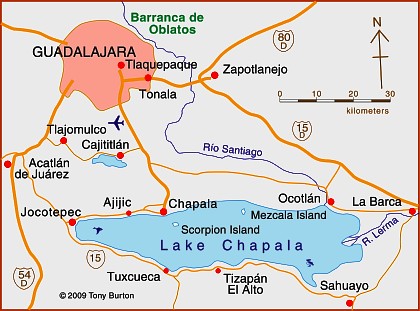We don’t often champion causes in these pages, but are more than willing to lend our support to a campaign hoping to persuade UNESCO to declare Lake Chapala a “World Heritage” site. The campaign appears to have stalled, and deserves more support.
The following 6-minute video (English subtitles) from 2008 sets the scene for those unfamiliar with the area:
Where is Lake Chapala?
Why should Lake Chapala be declared a World Heritage site?
Natural history: it is Mexico’s largest natural lake and home to some unique endemic fauna.
Cultural and historic significance: it is a sacred site for the indigenous Huichol Indian people. Specifically, the southernmost “cardinal point” in their cosmology is XapaWiyemeta, which is Scorpion Island (Isla de los Alacranes) in Lake Chapala.
In the nineteenth century, as Mexico fought for its independence from Spain, Lake Chapala was the scene of a truly heroic struggle, centered on Mezcala Island, between the Royalist forces and a determined group of insurgents. It proved to be a landmark event, since after four years of fighting, an honorable truce was agreed.
At the very end of the nineteenth century, influential families from Mexico and from overseas “discovered” Lake Chapala. For several years, Mexico’s then president, Porfirio Díaz, made annual trips to vacation at the lake. As the twentieth century progressed, the area attracted increasing numbers of authors, poets and artists, many of them from abroad, including such greats as D.H. Lawrence, Tennessee Williams, Witter Bynner, Charles Pollock and Sylvia Fein. (To discover more of the literary and artistic characters associated with Lake Chapala, please see this on-going series of mini-biographies.)
Today, it is the single largest retirement community of Americans anywhere outside of the USA.
Is this enough to qualify Lake Chapala for World Heritage status? I don’t know, but it certainly seems worth a shot!
Posts related to Lake Chapala:
- How big is Lake Chapala?
- How Lake Chapala, Mexico’s largest lake, was formed
- An early scientific account of Lake Chapala, Mexico’s largest natural lake (1837)
- Giant whirlpool swallows several boats (1896)
- The eastern end of Mexico’s largest lake, Lake Chapala, is amputated (1906)
- The Emiliano Zapata Model Ejido near Tizapán el Alto in Jalisco
- The sacred geography of Mexico’s Huichol Indians (the southernmost cardinal point of the Huichol belief system is XapaWiyemeta, which is Scorpion Island (Isla de los Alacranes) in Lake Chapala).
Tourism in the Lake Chapala (Ajijic, Chapala, Jocotepec) and the Lerma-Chapala basin:
- Retirees and “residential tourism”: a case study of Chapala-Ajijic in Jalisco
- Day trips and tourism in the Lerma-Chapala basin
- Tourism’s environmental impacts in the Lerma-Chapala drainage basin
- How can tourism perception be assessed? A case study using the Lerma-Chapala drainage basin
Want to read more?
For general introduction and background to this area, see the first eight chapters of my Western Mexico: A Traveler’s Treasury (4th ed, 2013). In the words of Dale Palfrey, reviewing the book for the Guadalajara Reporter, “First published in 1993, the revised and expanded fourth edition of “Western Mexico”… opens with what qualifies as the most comprehensive guide to the Lake Chapala region available in English.“
For a more in-depth account of the history of the Lake Chapala region up to 1910, see my Lake Chapala Through the Ages, an anthology of travelers’ tales. It features informative extracts from more than fifty original sources, linked by explanatory text and comments, together with brief biographies of the writers of each extract. They include some truly fascinating characters… see for yourself!
Both books are available as regular print books, or in Kindle and Kobo editions.

Sorry, the comment form is closed at this time.